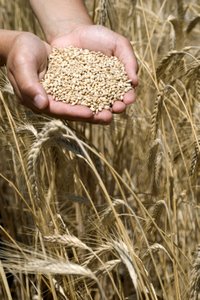The מנחה (minchah- grain offering) offering is the second of the qorbanot and is described in Leviticus chapter 2.
Now when anyone presents a grain offering [minchah] as an offering [qorban] to the LORD, his offering shall be of fine flour, and he shall pour oil on it and put frankincense on it. (Leviticus 2:1)
The KJV translates minchah as a "meat offering". There is no meat involved, however, in a minchah offering. Only grain is used in this qorban.
The details of the minchah qorban that are described in Leviticus chapter 2 are listed below.
The minchah is presented to the priest and brought before the bronze altar (Leviticus 2:8).
The priest takes a memorial portion (Heb: azkarah- a reminder) and offers it up in smoke on the altar. It is a soothing aroma to the LORD (Leviticus 2:9)
The remaining part of the grain offering belongs to Aaron and his sons and is considered to be holy (Leviticus 2:10).
No Leaven or Honey
Leviticus 2:11 tells us that the minchah should not include leaven or honey. It appears that leaven or honey may be brought as a "first fruit offering" [Heb: reishit] but not as for minchah (Leviticus 2:12).
First Fruits
Leviticus 2:14-16 describes the grain offering [minchah] of "early ripened things" [Heb: bikurim]. These should be of fresh heads of grain roasted in a fire, "grits" (kernels) of new growth. It should have oil and incense on it. The memorial portion of it is offered up in smoke before the LORD.
A voluntary offering
The minchah is a voluntary offering that is not compulsory. As noted above the first minchah offering described in Scripture is brought by Cain and Abel.
So it came about in the course of time that Cain brought an offering [minchah] to the LORD of the fruit of the ground [m'peri ha-adamah]. Abel, on his part also brought of the firstlings of his flock [m'bekorot tzonu] and of their fat portions. And the LORD had regard for Abel and for his offering [minchah]; but for Cain and for his offering [minchah] He had no regard. So Cain became very angry and his countenance fell. (Genesis 4:3-5)
Cain brought the "fruit of the ground": grain. (Genesis 4:3)
Abel brought the "firstlings of the flock": sheep or goats. (Genesis 4:4)
Both of these are described as minchah but the minchah that is commanded in the Torah is only supposed to be a grain offering.
Why are both of these described as minchah?
The Hebrew word minchah literally means "a gift or tribute"1. Cain and Abel brought gifts before G-d.
It is only in the commandments of Leviticus does G-d specify that the minchah should be a gift of grain.
Commentary:
Why was Cain's gift rejected while Abel's was accepted?
Abel acted by faith:
By faith Abel offered to God a better sacrifice than Cain, through which he obtained the testimony that he was righteous, God testifying about his gifts, and through faith, though he is dead, he still speaks. (Hebrews 11:4)
Abel's offering (his "deeds", his "works") were coupled with the blood of the lamb and provided the perfect picture of how it is only the Blood of the Lamb that makes our deeds/works acceptable to G-d.
Law for Minchah
The "law for minchah" is found in Leviticus chapter 6 and includes:
- The sons of Aaron shall present the minchah before the LORD in front of the altar. (Lev 6:14)
- One of them shall lift up a handful of the fine flour with its oil and all the incense that is on the grain offering and offer it up in smoke, a soothing aroma as a memorial [Heb: azkarah] to the LORD. (Lev 6:15)
- What is left of the minchah Aaron and his sons are to eat as unleavened cakes [Heb: matzah] which are to be eaten in the enclosure of the tent of meeting. (Lev 6:16)
- It shall not be baked with leaven. (Lev 6:17)
- G-d has given the priests' portion of the minchah to them as their share of G-d's fire offerings. (Lev 6:17)
- The priests' portion is most holy [Heb: qodesh qodeshim] like the sin offering and the guilt offering. (Lev 6:17)
- Every male among the sons of Aaron may eat it. (Lev 6:18)
- The minchah is a permanent ordinance through the generations of Israel from among the offerings by fire to the LORD. (Lev 6:18)
- Whoever touches these offerings will become consecrated (made holy) [Heb: qadash] (Lev 6:18)
Additional instructions for the minchah are found in Leviticus 7:
- Every minchah that is baked in the oven, prepared in a pan or on a griddle shall belong to the priest who presents it. (Lev 7:9)
- Every minchah mixed with oil or dry shall belong to all the sons of Aaron, to all alike. (Lev 7:10)
